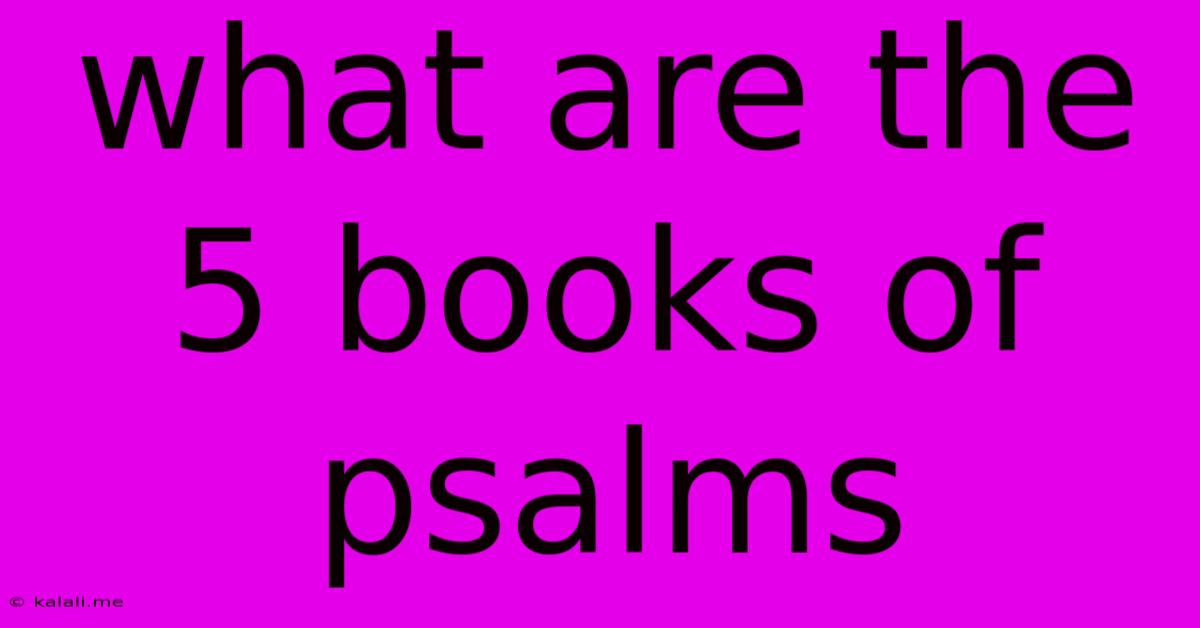What Are The 5 Books Of Psalms
Kalali
Jun 02, 2025 · 4 min read

Table of Contents
What Are the 5 Books of Psalms? Understanding the Structure of the Psalter
The Book of Psalms, also known as the Psalter, is a central book in the Hebrew Bible and the Christian Old Testament. It's a collection of 150 poems and prayers, expressing a wide range of human emotions – praise, lament, thanksgiving, and imprecation – all directed towards God. Instead of being a single, unified work, it's actually structured into five smaller books, each with its own unique character and thematic focus. Understanding this five-book structure is key to appreciating the Psalter's depth and complexity. This article will delve into the five books of Psalms, exploring their distinctive characteristics and overall contribution to the larger narrative.
Why is the Psalter divided into five books?
The division into five books likely reflects the structure of the Torah (the first five books of the Bible). Just as the Torah recounts creation and the establishment of God's covenant with Israel, the Psalter mirrors this journey of faith, showcasing the diverse expressions of worship and relationship with God throughout history. This deliberate structure suggests a deliberate literary and theological intention, enhancing the overall message and impact of the Psalms.
The Five Books of Psalms: A Detailed Look
The division isn't explicitly marked in the text itself, but is apparent through careful analysis of the concluding verses of each book. Let's explore each book individually:
1. Book 1 (Psalms 1-41): This book sets the stage, introducing the core themes of the Psalter. It focuses heavily on praise and lament, with a significant number of psalms attributed to David. We see expressions of trust in God even amidst suffering, and a strong emphasis on God's kingship and justice. The book ends with Psalm 41, a psalm of David's suffering and his plea for God's mercy. This foreshadows the themes of suffering and redemption found throughout the rest of the Psalter. Key topics include: Davidic kingship, individual piety, and the importance of trusting God.
2. Book 2 (Psalms 42-72): This book builds on the previous one but shows a growing awareness of the corporate dimension of faith. Many psalms in this book reflect the experiences and concerns of the entire community of Israel. It explores themes of exile, longing for God's presence, and hope for restoration. Psalm 72, a powerful prayer for Solomon's successful reign, provides a hopeful conclusion focusing on the ideal of just and righteous kingship. Themes central to this book include: communal worship, exile, and the hope for a righteous kingdom.
3. Book 3 (Psalms 73-89): This book confronts the problem of evil and suffering, exploring the apparent prosperity of the wicked and the hardships faced by the righteous. Psalms within this section wrestle with questions of justice and faith, questioning why the ungodly seem to flourish while the faithful endure hardship. The book concludes with Psalm 89, a lament for the fading glory of the Davidic dynasty, highlighting the precariousness of human power and the enduring sovereignty of God. Key themes include: the problem of evil, justice, and the enduring nature of God's covenant.
4. Book 4 (Psalms 90-106): This relatively shorter book shifts the focus to God's faithfulness throughout history. It includes psalms of praise for God's creation and mighty acts, alongside reflections on the history of Israel. The psalms here emphasize God's enduring covenant and His unwavering love, even in the face of national adversity. This section provides a historical perspective on God's interaction with His people, illustrating both their failings and God's continued grace. Themes explored include: God's creation, historical reflection, and God's steadfast love.
5. Book 5 (Psalms 107-150): This final book is a powerful culmination of praise and thanksgiving. It starts with psalms recounting God's deliverance and ends with a series of Hallelujah psalms—exuberant expressions of praise to God. The inclusion of a wide variety of musical instruments in the final psalms emphasizes the communal aspect of worship and the overwhelming joy of praising God. This book serves as a triumphant conclusion to the entire Psalter, leaving the reader with a profound sense of God's power, love, and unwavering presence. Key themes include: Hallelujahs, praise, thanksgiving, and the universal call to worship.
Understanding the five books of Psalms enhances our appreciation of this rich and multifaceted collection. It reveals a carefully constructed literary structure that mirrors the unfolding of faith, demonstrating the ongoing relationship between God and His people, expressed through a kaleidoscope of human emotions and experiences. By studying each book individually and their collective narrative, we gain a deeper understanding of the depth and breadth of the Psalter's theological insights.
Latest Posts
Latest Posts
-
Why Is Song Of Solomon In The Bible
Jun 04, 2025
-
Word To Make Someone Not Fel Welcome
Jun 04, 2025
-
Tubeless Kart Tire Has Big Leak
Jun 04, 2025
-
How To Remove Smell From Kitchen Sink
Jun 04, 2025
-
How Do You Know If Alternator Or Battery Is Bad
Jun 04, 2025
Related Post
Thank you for visiting our website which covers about What Are The 5 Books Of Psalms . We hope the information provided has been useful to you. Feel free to contact us if you have any questions or need further assistance. See you next time and don't miss to bookmark.